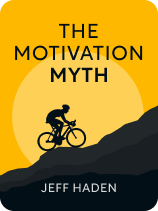

This article is an excerpt from the Shortform book guide to "The Motivation Myth" by Jeff Haden. Shortform has the world's best summaries and analyses of books you should be reading.
Like this article? Sign up for a free trial here.
What is the power of saying no? Why should you set boundaries at home and work?
If you want to make others happy, you might be inclined to say “yes” to everything. But, as The Motivation Myth by Jeff Haden claims, this could prevent you from achieving your dreams because you’ll lose focus.
Learn more about the power of saying no and how boundaries keep you on the path to success.
The Power of No
Saying no to yourself is hard, and saying no to other people and external commitments can sometimes be even harder. To stay resiliently focused on the tasks and goals that matter most, evaluate anything that diverts your time and energy by whether it serves your primary goal. This includes your habitual distractions, work obligations, and even opportunities that may look appealing but are wasteful in the long run.
One tool that Haden provides to emphasize the power of saying no is to reframe “I can’t” statements as “I don’t.” For example, if you’re spending an afternoon making calls to build your client base (toward your goal of being a freelance public speaker) and you’re frequently tempted to quit this task early, don’t tell yourself “I can’t stop until I’ve made my daily quota.” Say instead, “I don’t stop until I’ve made my daily quota.” The word “can’t” opens the door to resentment—as if the stated task was imposed from outside—while leaving room to negotiate with yourself. Rephrasing as “I don’t” makes completing the task a part of who you are and has been shown to bolster resilience and motivation.
(Shortform note: Tapping into your sense of identity is a powerful way to enact change, but it can be more complex than simply changing “I can’t” to “I don’t.” In Switch, Chip and Dan Heath point out that identity can serve as a barrier to change if you have a “fixed mindset”—the belief that your identity is hard-wired in your brain and therefore immutable. To leverage your identity as a tool for change, you’ll have to adopt a “growth mindset”—the belief that change is possible through consistent effort. Thankfully, you can develop a growth mindset by pushing through challenges and setbacks while accepting them as part of the process toward your goal.)
Setting up boundaries at work is also vital. Odds are that you spend a great deal of time not focusing on the tasks that you’re best at or pushing yourself forward to your goal. If you’re already a high achiever, this is likely because you’ve said “yes” too often and have taught your colleagues that you’re always available. Haden suggests dialing back on this habit so that the people you work with won’t use you as a crutch. Don’t be afraid to deflect and delegate jobs that don’t support your main goals. Setting boundaries isn’t dismissive—to the contrary, it can foster productive relationships and help your colleagues to be more self-reliant.
(Shortform note: It can be hard to set boundaries as Haden suggests because telling someone no feels like a flat-out rejection that might be reciprocated in kind. However, it needn’t be that way. In Never Split the Difference, Chris Voss and Tahl Raz argue that “no” is merely the first step in a process of negotiation resulting in more personal autonomy. The word “no” can change a conversation from “please interrupt your work and do something for me” to a solution-based discussion to determine what best supports the goals of both parties.)
This also involves saying no to things that may seem like opportunities at first glance, such as a request to mentor someone, plan a party, or accept additional work responsibilities. Haden argues that you should look at each offer and ask if it will help you on your way to your goal and if it will do so better than the plan you’re following now. If the answer is no, then as much as it pains you in the short term, turning down an opportunity can be a choice that saves energy and time.
(Shortform note: In Essentialism, Greg McKeown goes into more detail than Haden about setting criteria for when to say no. For unexpected opportunities that arise, McKeown suggests a way to give them serious thought: List three minimum criteria the opportunity would have to meet to serve your goal. If it doesn’t meet all three of those criteria, reject it. If it passes, think of three more critical criteria it would have to fulfill for you to take it on. McKeown suggests that to be worth your time, an unexpected opportunity would have to meet two out of your three additional criteria. Otherwise, it’s not your best use of time and energy.)

———End of Preview———
Like what you just read? Read the rest of the world's best book summary and analysis of Jeff Haden's "The Motivation Myth" at Shortform.
Here's what you'll find in our full The Motivation Myth summary:
- Why you should stop waiting for motivation to hit and instead, make your own
- How to create a cycle of positive reinforcement to boost your motivation
- How to develop resilience to get through times of struggle






